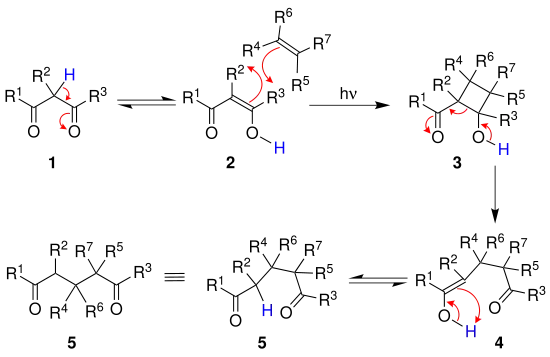De-Mayo-Reaktion
Die De-Mayo-Reaktion ist eine Namensreaktion der organischen Chemie und benannt nach Paul Jose De Mayo (1924–1994). In dieser Reaktion kann ein 1,5-Diketon erhalten werden, indem eine photochemische Reaktion eines Alkens mit einem enolisierbaren 1,3-Diketon stattfindet. Die Reaktion wird als Dominoreaktion klassifiziert.[1]
 Übersicht der De-Mayo-Reaktion
Übersicht der De-Mayo-Reaktion
Mechanismus
Das enolisierbare 1,3-Diketon 1 reagiert mit einem Alken in einer [2+2]-Cycloaddition. Es entsteht ein β-Hydroxyketon 3. Diesem Reaktionsschritt folgt eine Retro-Aldol-Reaktion, die zur Öffnung des Cyclobutanringes 3 führt. Über ein Keto-Enol-Gleichgewicht bildet sich mechanistisch eine 1,5-Diketoverbindung 5.[2]
 Reaktionssequenz der De-Mayo-Reaktion
Reaktionssequenz der De-Mayo-Reaktion
Literatur
- P. de Mayo, H. Takeshita, A. B. M. A Sattar: The Photochemical Synthesis of 1,5-Diketones and their Cyclisation. A New Annulation Process. In: Proceedings of the Chemical Society. 1962, S. 119, doi:10.1039/PS9620000097.
- Paul de Mayo: Enone photoannelation. In: Accounts of Chemical Research. 4, Nr. 2, 1971, S. 41–47, doi:10.1021/ar50038a001.
- J. J. Li: Name Reactions. A Collection of Detailed Reaction Mechanisms. Springer, 2009, ISBN 978-3-642-01052-1, S. 173.
Einzelnachweise
- zu Paul Jose de Mayo siehe: James F. King, Karl Overton: Paul Jose De Mayo. 8 August 1924 — 26 July 1994 Elected F.R.S. 1975. In: Biographical Memoirs of Fellows of the Royal Society. 45, 1999, S. 111–128, doi:10.1098/rsbm.1999.0009.
- László Kürti, Barbara Czakó: Strategic Applications of Named Reactions in Organic Synthesis. Elsevier Academic Press, Burlington/San Diego/London 2005, ISBN 0-12-369483-3.
This article is issued from Wikipedia. The text is licensed under Creative Commons - Attribution - Sharealike. The authors of the article are listed here. Additional terms may apply for the media files, click on images to show image meta data.